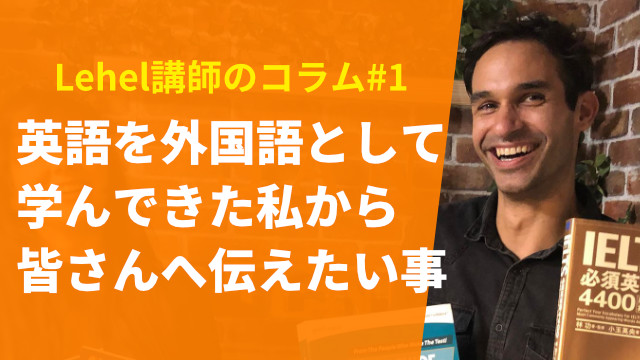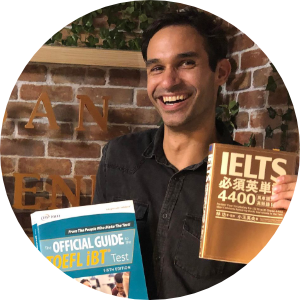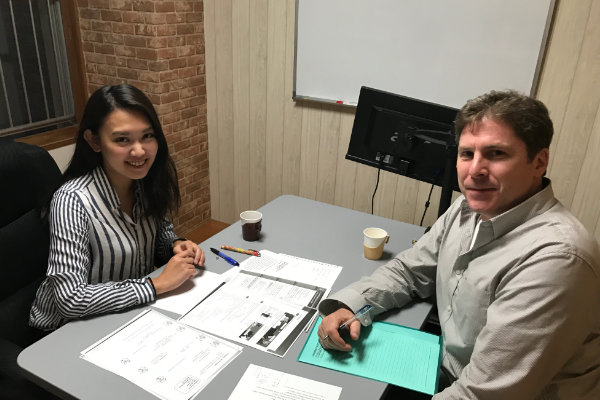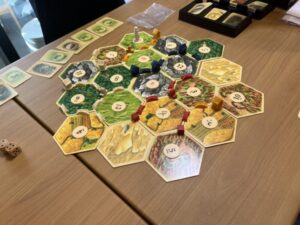

LEHEL BALOGH(レヘル講師)
サンフレンズのアカデミック担当英語講師。ハンガリー出身。
札幌に来る前は韓国の大学でTOEFLなどのアカデミック英語試験対策の教授として勤務した経歴を持つ。
哲学者としてハンガリー・ギリシャ・アメリカ・韓国・日本各地の大学で研究を行い、現在、英語講師として職務に励みながら哲学の研究に関する英語の書籍を執筆中。
第二言語として英語を学ぶこと

Learning English appears to be a daunting task for many of us who take it up as a second or third language. The pronunciation seems a mess, tenses and grammatical structures look, for the most part, alien, and the large variety of colloquialisms and slangs are equally intimidating for the novice. I, for one, come from Hungary where we tend to struggle a great deal with learning English, because the local language, Hungarian, is markedly different from the English language. Hungarian belongs to the Uralic language family that is not part of the much larger Indo-European family to which most of the languages of Europe, including English, belong. In other words, the two languages are, by and large, strangers to each other. Naturally, a millennium of sharing the same continent with peoples that speak an assortment of other Indo-European languages, such as Russian, German, French or Spanish, has assisted the Hungarian language and its speakers, the Hungarians, to familiarize themselves with English as well. Nevertheless, it is not much easier for us to learn English properly than it is for a Japanese or a Korean student whose native tongues surprisingly show more affinities with the Hungarian language than with the English (or Russian, or German, or French, or Spanish).
発音はめちゃくちゃだし、時制や文法構造はほとんど異質だし、口語体やスラングも多種多様で、初心者にとっては怖くて仕方がないですよね。
私はハンガリー出身ですが、ハンガリー人の母国語であるハンガリー語は英語と大きく異なるため、英語の学習にはかなり苦労します。
ハンガリー語はウラル語族に属し、英語を含むヨーロッパの言語の多くが属するインド・ヨーロッパ語族には属しません。
つまり、ハンガリー語と英語は他人同士なのです。
もちろん、ロシア語、ドイツ語、フランス語、スペイン語など、さまざまなインド・ヨーロッパ語族を話す人々と同じ大陸で千年以上暮らしてきたおかげで、ハンガリー語とその話者であるハンガリー人は、英語にも慣れ親しんできました。
とはいえ、日本人や韓国人のように、英語(あるいはロシア語、ドイツ語、フランス語、スペイン語)よりもハンガリー語に親和性のある言語を母語とする人が、英語をきちんと学ぶのはそれほど容易いことではありません。
本質的な英語学習とは

Even though you may feel at times that learning English is an impossible challenge, I assure you: it is not. Of course, one can learn a language on rather different levels. From the level of being able to read a new alphabet or to conduct basic conversation to the level of composing gripping poetry or giving an eloquent speech on the target language, there are endless shades of language mastery. But the main thing is this: one must first learn to appreciate and savor the step by step progress by which new vistas appear on one’s linguistic horizon. We cannot master a new language overnight, it takes time and dedication. We cannot master a new language by everlasting rote learning, either: it is dull and ultimately pointless. The same is true for the exclusive listening of songs and watching of TV shows and dramas. Neither gives a language learner a true sense of how the language operates in its actuality, how one should or could go beyond the mere platitudes and formulaic expressions that language learning books offer to us. The only reliable way to appropriate and own a new language is to speak it with those who are already proficient in it. No matter how many mistakes one makes, no matter how many times one makes the same mistakes, saying the words out loud by putting them in a grammatically acceptable order is what constitutes actual language usage. One could argue that typing sentences using a language on a screen without ever uttering a word in a social situation already qualifies as real language usage. However, the repeated act of utterance is the method that solidifies the new linguistic patterns to the greatest degree; besides, it also necessitates a live audience – an interlocutor – with whom one must engage into a conversation from which invaluable feedback can be gained.
もちろん、語学の習得にはさまざまなレベルがあります。
新しいアルファベットが読める、基本的な会話ができるといったレベルから、心を打つ詩を作ったり、対象言語について雄弁なスピーチをしたりするレベルまで、言語の習得には無限の幅があります。
しかし、重要なのは、自分の言語の地平に新しい展望が現れるまでの一歩一歩の進歩に感謝し、味わうことをまず学ばなければならないということです。
一夜にして新しい言語をマスターすることはできません。
また、いつまでも暗記学習で新しい言語をマスターすることもできません。
それは退屈で、結局は無意味なことなのです。
同じことは、歌ばかりを聴いたり、テレビ番組やドラマを見たりすることにも当てはまります。
その言語が実際にどのように使われているのか、言語学習書が提供する単なる決まり文句や定型表現をどのように超えるべきなのか、あるいは超えることができるのか、どちらも言語学習者に真の意味での感覚を与えてはくれません。
新しい言語を自分のものにする唯一の確実な方法は、その言語をすでに使いこなしている人たちと一緒に話すことです。
どんなに間違えても、何度同じ間違いを繰り返しても、文法的に受け入れられる順序で言葉を並べて声に出すことが、実際の言語使用を構成するのです。
社会的な場面で一度も言葉を発することなく、画面上でその言語を使って文章をタイピングすることは、すでに実際の言語使用の一つと言えるかもしれません。
しかし、「話す」という行為を繰り返すことで、新しい言語パターンを最大限に定着させることができます。
また、「話す」という行為には、生身の人間(インターロケーター)が必要であり、その人間と会話をすることで、貴重なフィードバックを得ることができるのです。
英語学習への大切な心構え

A new language is like a new continent one sets out to explore. Our mother tongue has its own identity; so does English. How do we approach this new continent that has a different identity than our homeland? We ought to approach it with genuine interest, ample enthusiasm, and, if possible, as much excitement concerning the adventure that lies before us as possible. Language learning does not need to be boring. Whenever there is clear motivation, enough excitement is generated that helps us pull through the harder parts. On the other hand, language learning is not easy and is not supposed to be easy: if it were, it wouldn’t really be learning, would it? Whatever is worth acquiring needs time and effort that we put into the endeavor of its acquisition. We must therefore learn to use our time and efforts well. An empty studying hour will be empty unless we fill it up with meaningful and fun ways of activities that train us in some new aspects of a language. Five minutes of pleasurable exercising of our minds is worth more than fifty minutes of rote learning whereby our minds just keep wandering off. In short, one must find ways that keeps one’s mind actively engaged: don’t just read it in your head; read it out loud, and ask others to correct you when in doubt. Talk and write about things that interest you as fluently as possible. Do not mind the mistakes too much; they will take care of themselves. Sooner or later you will learn the right word, the right pronunciation, the right phrase. Read and listen to topics that genuinely move you or those that motivate you to know more about them. Give yourself credit that with regular study you will improve way beyond the level that you can possibly imagine right now. Because you can: all of us can. When I was fourteen, my English competence was limited to reading simple stories and conversing on an elementary level. When I was nineteen, I could read and talk on a more advanced level, thanks to my strong interest in foreign cultures and literatures. Not much later I began writing articles in English, and by the time I began my doctoral studies at the age twenty-four, I was able to start lecturing in English. I am in no way special or smarter than you are: the only reason I could progress well was that I enjoyed learning about foreign cultures and talking to foreigners even with my broken English, because I wanted to know who they were and how were they different from me. Owing to this attitude, I have learned as much about them as I have about myself and the world we live in.
母国語には母国語の、英語には英語のアイデンティティがあります。
母国とは異なるアイデンティティを持つこの「英語」という語学的な新大陸に、私たちはどのようにアプローチすればよいのでしょうか。
私たちは、純粋な興味と十分な熱意をもって、そして可能であれば、目の前にある冒険に対してできるだけ多くの興奮を覚えながら、英語にアプローチしなければなりません。
語学学習が退屈である必要はありません。
明確な動機づけがあれば、困難な局面でも十分な楽しさが、やり甲斐がもたらされます。
一方、言語学習は簡単ではありませんし、簡単であるべきでもありません。
そうであれば、それは本当の学習ではないでしょう?
習得する価値のあるものには、習得のための努力に費やす時間と労力が必要です。
ですから、私たちは時間と努力をうまく使うことを学ばなければなりません。
空っぽの勉強時間は、その言語の新しい側面を学ぶための有意義で楽しい活動で埋め尽くさない限り、空っぽのままです。
5分間の楽しい頭の体操は、50分間の暗記学習よりも価値があり、頭がぼんやりしてしまうでしょう。
つまり、頭で考えるだけでなく、声に出して読んだり、疑問があれば他の人に指摘してもらったりして、頭を活発に働かせる方法を見つけなければならないのです。
興味のあることは、できるだけ流暢に話したり書いたりしましょう。
間違いはあまり気にしないでください。
遅かれ早かれ、正しい単語、正しい発音、正しいフレーズを学ぶことができます。
純粋に感動した話題や、もっと知りたいと思った話題は、読んだり聞いたりしてみましょう。
定期的に勉強すれば、今想像しているレベルよりもずっと上達するのだと、自分を褒めてあげてください。
なぜなら、あなたはできる、私たちは皆できるのですから!
14歳のとき、私の英語力は簡単な物語を読むことと、初歩的な会話をすることができる程度でした。
19歳のとき、私は外国の文化や文学に強い関心を持ち、より高度なレベルで読んだり話したりできるようになりました。
その後、英語で論文を書くようになり、24歳で博士課程に入る頃には、英語で講義を提供することができるようになりました。
私が皆さんより特別な人間でもなければ、頭がいいわけでもないのです。
ただ、外国の文化について学ぶこと、外国人と話すことが好きで、つたない英語でも、彼らが誰で、自分とどう違うのかを知りたいと思ったからこそ、現在の英語力を得る事が出来ました。
また、このような姿勢のおかげで、私は自分自身や私たちの住む世界について学んだのと同じくらい、外国人についても学ぶことができました。



![[英検準2級] 自分の意見を答える問題はどうすれば良い?](https://sanfriends.asia/wp-content/uploads/2022/08/202208191-300x169.jpg)
![[2022年9月] 入会金半額キャンペーンのお知らせ](https://sanfriends.asia/wp-content/uploads/2022/08/202208304-300x169.jpg)
![[札幌のIELTS受験者必見] IELTS(アイエルツ)を徹底解説](https://sanfriends.asia/wp-content/uploads/2022/04/04258-640x360.jpg)

![[英検準2級] 絶対に覚えるべき二次面接パッセージ音読のコツ](https://sanfriends.asia/wp-content/uploads/2022/07/2022071520-150x150.jpg)





